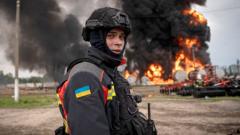As we mark the 50th anniversary of the Vietnam War's end, its poignant imagery continues to influence American perceptions of conflict.
The Transformative Power of Vietnam War Photography

The Transformative Power of Vietnam War Photography
Reflecting on the Lasting Impact of Images from the Vietnam War
In April 1975, the Vietnam War came to a close, yet its legacy is profoundly encapsulated in the photographic documentation that emerged during this tumultuous period. Often referred to as the "living room war," the Vietnam conflict was unique in how it reached American households, bringing graphic and haunting depictions of war into daily life through television and powerful photography. Notably, photojournalists like Dickey Chapelle, the first woman to lose her life covering the war, alongside Tim Page and Henri Huet, created images that conveyed the raw emotions of this catastrophic era.
These photographs captured not just the violence and destruction, but also the depth of suffering and the humanity of those involved. Underflown by a spectral breath of political perspectives, their work transcended mere documentation, as it stirred discussions and responses that increased anti-war sentiments among Americans. Continuously evolving narratives, underscored by compelling visuals, compelled viewers to confront the brutal realities of conflict and reconsider their national identity and values in relation to war.
Tim O’Brien's quote captures the essence of the discourse invoked by these images: “I survived, but it’s not a happy ending.” Today, as we remember the Vietnam War's conclusion, we must also acknowledge the ways these iconic photographs have reshaped perspectives and continue to resonate, demanding reflection upon the essence of war and peace in American society.
These photographs captured not just the violence and destruction, but also the depth of suffering and the humanity of those involved. Underflown by a spectral breath of political perspectives, their work transcended mere documentation, as it stirred discussions and responses that increased anti-war sentiments among Americans. Continuously evolving narratives, underscored by compelling visuals, compelled viewers to confront the brutal realities of conflict and reconsider their national identity and values in relation to war.
Tim O’Brien's quote captures the essence of the discourse invoked by these images: “I survived, but it’s not a happy ending.” Today, as we remember the Vietnam War's conclusion, we must also acknowledge the ways these iconic photographs have reshaped perspectives and continue to resonate, demanding reflection upon the essence of war and peace in American society.





















